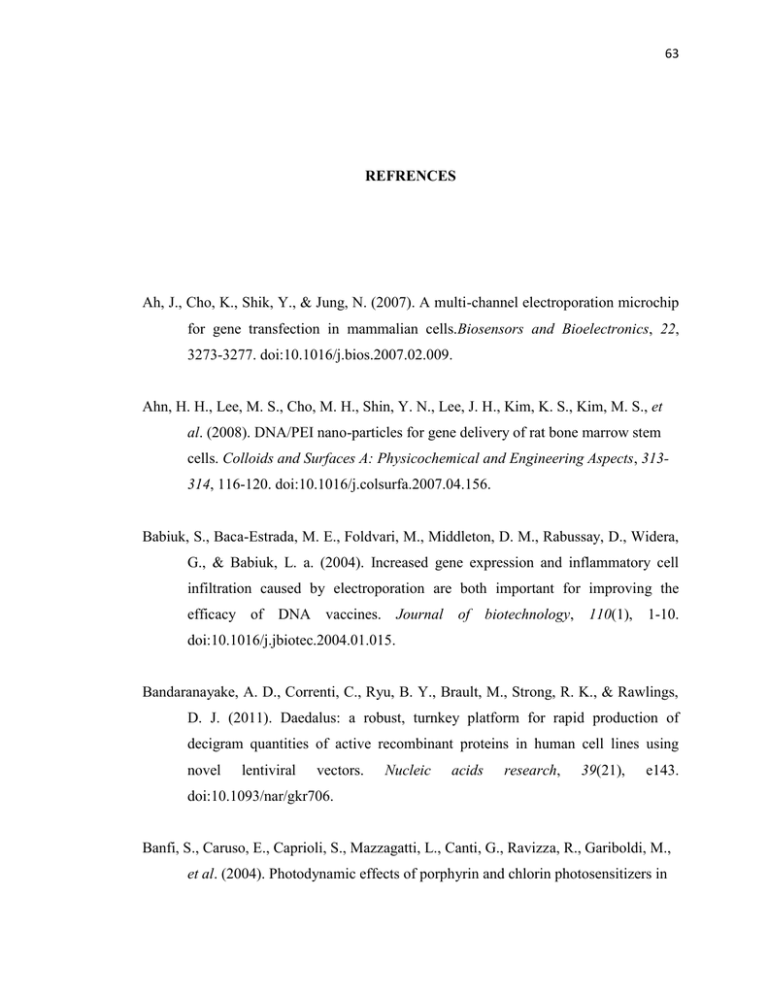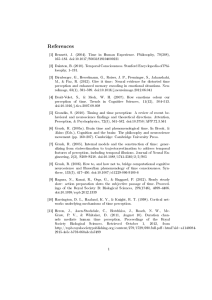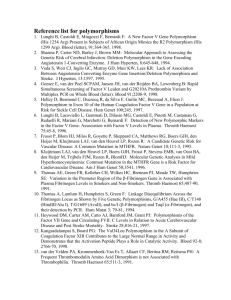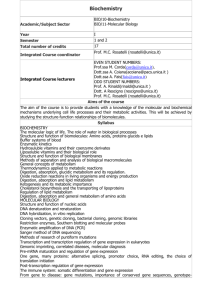Ah, J., Cho, K., Shik, Y., & Jung, N. (2007).... Biosensors and Bioelectronics REFRENCES
advertisement

63 REFRENCES Ah, J., Cho, K., Shik, Y., & Jung, N. (2007). A multi-channel electroporation microchip for gene transfection in mammalian cells.Biosensors and Bioelectronics, 22, 3273-3277. doi:10.1016/j.bios.2007.02.009. Ahn, H. H., Lee, M. S., Cho, M. H., Shin, Y. N., Lee, J. H., Kim, K. S., Kim, M. S., et al. (2008). DNA/PEI nano-particles for gene delivery of rat bone marrow stem cells. Colloids and Surfaces A: Physicochemical and Engineering Aspects, 313314, 116-120. doi:10.1016/j.colsurfa.2007.04.156. Babiuk, S., Baca-Estrada, M. E., Foldvari, M., Middleton, D. M., Rabussay, D., Widera, G., & Babiuk, L. a. (2004). Increased gene expression and inflammatory cell infiltration caused by electroporation are both important for improving the efficacy of DNA vaccines. Journal of biotechnology, 110(1), 1-10. doi:10.1016/j.jbiotec.2004.01.015. Bandaranayake, A. D., Correnti, C., Ryu, B. Y., Brault, M., Strong, R. K., & Rawlings, D. J. (2011). Daedalus: a robust, turnkey platform for rapid production of decigram quantities of active recombinant proteins in human cell lines using novel lentiviral vectors. Nucleic acids research, 39(21), e143. doi:10.1093/nar/gkr706. Banfi, S., Caruso, E., Caprioli, S., Mazzagatti, L., Canti, G., Ravizza, R., Gariboldi, M., et al. (2004). Photodynamic effects of porphyrin and chlorin photosensitizers in 64 human colon adenocarcinoma cells. Bioorganic & medicinal chemistry, 12(18), 4853-60. doi:10.1016/j.bmc.2004.07.011. Beck, V., Pfitscher, A., &Jungbauer, A. (2005).GFP-reporter for a high throughput assay to monitor estrogenic compounds, 64, 19-37. doi:10.1016/j.jbbm.2005.05.001. Benimetskaya, L., Takle, G. B., Vilenchik, M., Lebedeva, I., Miller, P., & Stein, C. A. (1998). Cationic porphyrins: novel delivery vehicles for antisense oligodeoxynucleotides. Nucleic acids research, 26, 5310–5317. Biesaga, M., Pyrzynska, K., &Trojanowicz, M. (2000).Porphyrins in analytical chemistry.Talanta, 51, 209-224. Cadete, A., Figueiredo, L., Lopes, R., Calado, C. C. R., Almeida, A. J., &Gonçalves, L. M. D. (2012). Development and characterization of a new plasmid delivery system based on chitosan–sodium deoxycholate nanoparticles. European Journal of Pharmaceutical Sciences, 45(4), 451-458. Casas, A., Battah, S., Di Venosa, G., Dobbin, P., Rodriguez, L., Fukuda, H., Batlle, A., et al. (2009). Sustained and efficient porphyrin generation in vivo using dendrimer conjugates of 5-ALA for photodynamic therapy. Journal of controlled release 135(2), 136-43. Elsevier B.V. doi:10.1016/j.jconrel.2009.01.002. Chen, Y., Zhou, L., Pang, Y., Huang, W., Qiu, F., Jiang, X., Zhu, X., et al. (2011).Photoluminescenthyperbranchedpoly(amido amine) containing β- cyclodextrin as a nonviral gene delivery vector. Bioconjugate chemistry, 22(6), 1162-70.doi:10.1021/bc200010w. Chesnoy, S., & Huang, L. (2002).Enhanced cutaneous gene delivery following intradermal injection of naked DNA in a high ionic strength solution.Molecular 65 therapy: the journal of the American Society of Gene Therapy, 5(1), 57-62. doi:10.1006/mthe.2001.0511. Chonna, A., &Cullisa, P. R. (1998). Recent advances in liposome technologies and their applications for systemic gene delivery. Advanced Drug Delivery Reviews, 30, 73-78. Danko, P. W., Herweijer, H., Zhang, G., Latendresse, J. S., Bock, I., & Wolff, J. A. (1997). High expression of naked plasmid DNA in muscles of young rodents.Human Molecular Genetics, 6, 1435–1443. Datki, Z., Juhász, A., Gálfi, M., Soós, K., Papp, R., Zádori, D., &Penke, B. (2003).Method for measuring neurotoxicity of aggregating polypeptides with the MTT assay on differentiated neuroblastoma cells.Brain Research Bulletin, 62(3), 223-229. doi:10.1016/j.brainresbull.2003.09.011 Denizot, F & Lang, R. (1986). Rapid colorimetric assay for cell growth and survival: Modifications to the tetrazolium dye procedure giving improved sensitivity and reliability. Journal of immunological methods, 89,271–277. Dolphin, D. (1978). THE PORPHYRINS , Structure and Synthesis. In D. Dlphin (Ed.), THE PORPHYRINS (I.).Academic Press. De Vry, J., Martinez-Martinez, P., Losen, M., Temel, Y., Steckler, T., Steinbusch, H. W. M., De Baets, M. H., et al. (2010). In vivo electroporation of the central nervous system: a non-viral approach for targeted gene delivery. Progress in neurobiology, 92(3), 227-44. doi:10.1016/j.pneurobio.2010.10.001 Falk, J. (1975). PORPHYRINS AND METALLOPORPHYRINS. (K. . M.SMITH, Ed.). Amsterdam: Elsevier Scientific Publishing Company. 66 Fink, D., DeLuca, N., Yamada, M., Wolfe, D., &Glorioso, J. (2000).Design and application of HSV vectors for neuroprotection.Gene Therapy, 7, 115-119. Flynn, S. M., George, S. T., White, L., Devonish, W., &Takle, G. B. (1999).WaterSoluble, Meso-Substituted Cationic Porphyrins—a Family of Compounds for Cellular Delivery of Oligonucleotides.BioTechniques, 26(4). Fortune, J. A., Novobrantseva, T. I., &Klibanov, A. (2011). Highly Effective Gene Transfection In Vivo by Alkylated Polyethylenimine. Journal of drug delivery. doi:10.1155/2011/204058. Gao, X., Kim, K.-S., & Liu, D. (2007). Nonviral gene delivery: what we know and what is next. The AAPS journal, 9(1), E92-104.doi:10.1208/aapsj0901009. Garikipati, D., & Chamberlain, J. S. (2010).Systemic Gene Delivery for Muscle Gene Therapy.In D. Duan (Ed.), Muscle Gene Therapy (pp. 163-181).Springer Science and Business Media.doi:10.1007/978-1-4419-1207-7_10. Gardlik, R., Pálffy, R., Hodosy, J., Lukács, J., Turňa, J., &Celec, P. (2005).Vectors and delivery systems in gene therapy.Medical Science Monitor, 11, RA110-121. Gene, C. liposomes for, & Delivery.(2005). Cationic liposomes for gene delivery.Expert Opinion on Drug Delivery, 2. Hadgiivanova, R. (2009). Aggregation of Amphiphilic Molecules in Solution: Thermodynamics, Metastability, and Kinetics. Tel Aviv Univeristy. Hanke, T., Neumann, V. C., Blanchard, T. J., Sweeney, P., Hill, a V., Smith, G. L., & McMichael, a. (1999). Effective induction of HIV-specific CTL by multi-epitope using gene gun in a combined vaccination regime. Vaccine, 17(6), 589-96. 67 Harisha, S. (2008). Biotechnology procedures and experiments handbook. Laxmi Publications, Ltd. Hasegawa, H., Wendling, J., He, F., Trilisky, E., Stevenson, R., Franey, H., Kinderman, F., et al. (2011).In vivo crystallization of human IgG in the endoplasmic reticulum of engineered Chinese hamster ovary (CHO) cells.The Journal of biological chemistry, 286(22), 19917-31. doi:10.1074/jbc.M110.204362. Heim, R., &Tsien, R. Y. (1996). Engineering green fluorescent protein for improved brightness , longer wavelengths and fluorescence resonance energy transfer. Current Biology, 178-182. Huang, L., Hung, M.-C., & Wagner, E. (Eds.).(2005). Nonviral Vectors for Gene Therapy (Second.).Academic Press. Hunt, M. a, Currie, M. J., Robinson, B. a, &Dachs, G. U. (2010).Optimizing transfection of primary human umbilical vein endothelial cells using commercially available chemical transfection reagents.Journal of biomolecular techniques: JBT, 21(2), 66-72. Hypothalamus Results in Persistent Over- Expression and Phenotypic Change. Iranian Biomedical Journal, 8(1)(January), 33-39. Kameda, S., Maruyama, H., Higuchi, N., Iino, N., Nakamura, G., Miyazaki, J., & Gejyo, F. (2004). Kidney-targeted naked DNA transfer by retrograde injection into the renal vein in mice. Biochemical and Biophysical Research Communications, 314(2), 390-395. doi:10.1016/j.bbrc.2003.12.107. Kamimura, K., Suda, T., Zhang, G., & Liu, and D. (2011).Advances in Gene Delivery Systems.Pharmaceutical Medicine, 25(5), 293-306. doi:10.2165/11594020. 68 Kay, M. A., Glorioso2, J. C., &Aldini, L. (2001). Viral vectors for gene therapy: the art of turning infectious. NATURE MEDICINE, 7(1), 33-40. Li, S., & Huang, L. (2000).Nonviral gene therapy: promises and challenges. Gene Therapy, 7, 31-34. Kramer-Marek, G., Serpa, C., Szurko, A., Widel, M., Sochanik, A., Snietura, M., Kus, P., et al. (2006). Spectroscopic properties and photodynamic effects of new lipophilic porphyrin derivatives: Efficacy, localisation and cell death pathways Journal of Photochemistry and Photobiology, 85(3),228. doi:10.1016/j.jphotobiol.2006.08.011. Lohse, S., Derer, S., Beyer, T., Klausz, K., Peipp, M., Leusen, J. H. W., van de Winkel, J. G. J., et al. (2011). Recombinant dimeric IgA antibodies against the epidermal growth factor receptor mediate effective tumor cell killing. Journal of immunology (Baltimore, Md.: 1950), 186(6), 3770-8. doi:10.4049/jimmunol.1003082. Lu, Y., Wang, Y., & Chang, G. (2009).Suppression of adenoviral-induced host immune response by TGFß1 expression.Gene Therapy and Molecular Biology, 13, 244253. Mahmoodi, M., Gardiner, J. V., Lotfi, A. S., & Bloom, S. R. (2004). The Demonstration of Polyethylenimine Mediated Gene Transfer into the Rodent. Mez˝o, G´., Her´enyi, L., Habdas, J., Majer, Z., My´sliwa-Kurdziel, B., T´oth, K., &Cs´ık, G. (2011).Syntheses and DNA binding of new cationic porphyrintetrapeptide conjugates.Biophysical Chemistry. doi:10.1016/j.bpc.2011.02.007. M.Kelly, J., J.Murphy, M., J.McConnell, D., &OhUigin, C. (1985). A comparative study of the intercton of 5,10,15,20-tetrakis (N-methylpyridlnium-4-yl)porphyrin and its zinc complex with DNA ing fluorescence spectescopy and topoisomerisation. Nucleic Acids Research, 13. 69 Mosmann, T. (1983). Rapid colorimetric assay for cellular growth and survival: Application to proliferation and cytotoxicity assays. Journal of immunological methods, 65, 55-63. Pasternack, R. F., Goldsmith, J. I., Szép, S., & Gibbs, E. J. (1998).A Spectroscopic and Thermodynamic Study of Porphyrin/DNA Supramolecular Assemblies.Biophysical Journal, 75(2). Patel, P. (2009). Therapy Analysis—Gene therapy.Pharma Projects, 29(11). Retrieved from www.pharmaprojects.com Patnaik, S., Tripathi, S. K., Goyal, R., Arora, a., Mitra, K., Villaverde, a., Vázquez, E., et al. (2011).Polyethylenimine-polyethyleneglycol-bis(aminoethylphosphate) nanoparticles mediated efficient DNA and siRNA transfection in mammalian cells. Soft Matter, 7(13), 6103.doi:10.1039/c1sm05147d. Pérez-Martínez, F. C., Guerra, J., Posadas, I., &Ceña, V. (2011).Barriers to Non-Viral Vector-Mediated Gene Delivery in the Nervous System.Pharm Res, 28, 1843– 1858. doi:10.1007/s11095-010-0364-7. Protocols & Applications Guide.(2011). Transfection guide available online at www.promega.com Pu, G., Yu, X., Pu, G., & Xi, F. (2009). Study on the aggregation behavior of cationic porphyrins and their interaction with ctDNA. Ragusa, A., García, I., &Penadés, S. (2007). Nanoparticles as Nonviral Gene Delivery Vectors.IEEE TRANSACTIONS ON NANOBIOSCIENCE, 6(4), 319-330. Research Group Nanotechnology for http://www.nano-lifescience.com Life Science (2010) Retrieved from 70 Riesenberg, R., Fuchs’, C., &Kriegmair, M. (1996). Original Paper Photodynamic Effects of SAminolevulinic Acid-induced Porphyrin on Human Bladder Carcinoma Cells In Vi ’tro. European Journal of Cancer, 32(2), 328-334. Robert, A., &Freitas, J. (2007). The Ideal Gene Delivery Vector: Chromallocytes , Cell Repair Nanorobots for Chromosome Replacement Therapy. Journal of evolution & technology, 16(1), 1-95. Roberts, J. P. (2004). Gene Therapy Research Has Made Significant Advances. In R. Espejo (Ed.), Gene Therapy.Greenhaven Press Roth, J., Lawrence, J., &Bobik, T. (1996).Cobalamin (Coenzyme B12):Synthesis and biological significance. Annual Reviews, 50, 137-181. Shan, Y., Luo, T., Peng, C., Sheng, R., Cao, A., Cao, X., Shen, M., et al. (2012).Biomaterials Gene delivery using dendrimer-entrapped gold nanoparticles as nonviral vectors.Biomaterials, 33(10), 3025-3035. Elsevier Ltd. doi:10.1016/j.biomaterials.2011.12.045 Shieh, M.-J., Peng, C.-L., C, P.-J.L., Chiu, C.-H., Tsai, T.-Y., Hsu, C.-Y., Yeh, C.-Y., et al. (2008). Non-toxic phototriggered gene transfection by PAMAM-porphyrin conjugates. Journal of Controlled Release, 129, 200–206. Tang, M. X., Redemann, C. T., & Szoka Jr, F. C. (1996). In vitro gene delivery by degraded polyamidoamine dendrimers. Bioconjugate chemistry, 7(6), 703-714. Thanaketpaisarn, O., Nishikawa, M., Yamashita, F., &Hashida, M. (2005). TissueSpecific Characteristics of in Vivo Electric Gene: Transfer by Tissue and Intravenous Injection of Plasmid DNA. Pharmaceutical Research, 22, 883-891. doi:10.1007/s11095-005-4583-2. Tjio, J. H., & Puck, T. T. (1958).GENETICS OF SOMATIC MAMMALIAN CELLS II .Chromosomal constitution of cells in tissue culture.THE JOURNAL OF EXPERIMENTAL MEDICINE, 108. 71 Tsien, R. Y. (1998). THE GREEN FLUORESCENT PROTEIN.Annual Reviews, 67, 509-544. Twentyman, P. R., & Luscombe, M. (1987). A study of some variables in a tetrazolium dye (MTT) based assay for cell growth and chemosensitivity. British journal of cancer, 56(3), 279. Uludag, H., &Sefton, M. V. (1990). Calorimetric assay for cellular activity in microcapsules Cell culture.Biomatenals, 11, 708-712. U.S. Department of Energy Genome Programs.http://genomics.energy.gov (2011). Wang, H., Cheng, H., Wang, F., Wei, D., & Wang, X. (2010). An improved 3-(4,5dimethylthiazol-2-yl)-2,5-diphenyl tetrazolium bromide (MTT) reduction assay for evaluating the viability of Escherichia coli cells. Journal of microbiological methods, 82(3), 330-3. Elsevier B.V. doi:10.1016/j.mimet.2010.06.014. Wolff, J. a. (1997). Naked DNA transport and expression in mammalian cells. Neuromuscular disorders : NMD, 7(5), 314-8. Retrieved from http://www.ncbi.nlm.nih.gov/pubmed/9267844. Wu, C.-M., & Chung, T.-C. (2006). Green fluorescent protein is a reliable reporter for screening signal peptides functional in Lactobacillus reuteri. Journal of microbiological methods, 67(1), 181-6. doi:10.1016/j.mimet.2006.03.009. Wysocki, P. J., MackiewiczWysocka, M., &Mackiewicz, A. (2002).Cancer-genetherapy-state-of-the-art.Reports of Practical Oncology & Radiotherapy, 7(4), 149-155. X-tremeGENE Easy DNA Transfection Protocols. (2011).Roch applied science. Roche Diagnostics. Retrieved from www.roche-applied-science.com 72 Xu, X., Yang, J., & Cheng, Y. (2011). Pharmacokinetic Study of Viral Vectors for Gene Therapy: Progress and Challenges. In K. Xu (Ed.), Viral Gene Therapy (pp. 435450). Xu, W., Liu, L., Mooslehner, K., &Emson, P. C. (1997). Structural organization of the human vesicular monomaine transporter type-2 gene and promoter analysis using the jelly fish green fluorescent protein as areporter. Molecular Brain Research, (96). Yoshizawa, J., Li, X.-K., Fujino, M., Kimura, H., Mizuno, R., Hara, A., Ashizuka, S., et al. (2004). Successful in utero gene transfer using a gene gun in midgestational mouse fetuses. Journal of Pediatric Surgery, 39(1), 81-84. doi:10.1016/j.jpedsurg.2003.09.001. Young, F. M., Phungtamdet, W., & Sanderson, B. J. S. (2005). Modification of MTT assay conditions to examine the cytotoxic effects of amitraz on the human lymphoblastoid cell line, WIL2NS. Toxicology in vitro: an international journal published in association doi:10.1016/j.tiv.2005.05.001. with BIBRA, 19(8), 1051-9.



